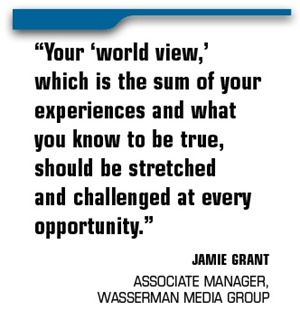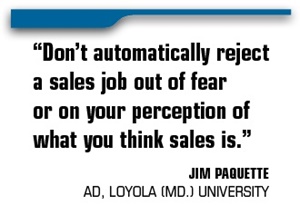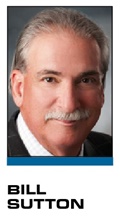Many of us have mentors or trusted confidants to whom we can turn for advice or to use as a sounding board for our thoughts and ideas. Often these mentors might not exactly be well-versed in our chosen field of endeavor, but nonetheless they have experience in the game of life and can provide advice through that lens.
As many students approach the final year of an undergraduate or graduate experience, they need advice about what they should be doing to help secure employment reasonably soon after graduation. For that purpose, I have solicited a number of my former graduate assistants and doctoral students to provide their thoughts. These are men and women who have lived through that particular year and found success, or are continuing to advise their own students and help prepare them for self-fulfillment, happiness and employment. I hope this information is helpful, will help ease anxiety, and will provide a road map for a student’s journey.
SUTTON ALUMNI CONTRIBUTORS
■ Artemisia Apostolopoulou, Robert Morris University
■ Kristine Carcione, LeadDog Marketing
■ Kayla Chesanek, Orlando Magic
■ Jay Gladden, IUPUI
■ Jamie Grant, Wasserman Media Group
■ Katie Hatch, Westchester Knicks/MSG
■ Kelly Higgins, NBA
■ Jez Lubenetski, Wasserman Media Group
■ Morgan Marr, Ferring Pharmaceuticals
■ Jay Monahan, PGA Tour
■ Jim Paquette, Loyola (Md.) University
■ Nicole Pincus, National Rugby League (Australia)
The members of my advisory board for this column all emphasized the need to build and develop relationships.
“Make meaningful relationships. While setting up the meeting is a great start, the follow-up is often the critical piece,” says Kayla Chesanek, special assistant to the chief operating officer at the Orlando Magic. “How do you want the person to remember you? The best way I found to make a memorable and meaningful connection is to reference a topic you discussed that is truly unique to your conversation. This can be done through a simple note or even a gift — the more creative, the better! In my last year, I sent everything from cookies shaped like fish (Valerie Camillo, Washington Nationals) to Ritz crackers and frosting (Scott O’Neil, Philadelphia 76ers and New Jersey Devils). Who doesn’t love food?”
A number of the individuals suggested that the students play “the student card” while they can. Kelly Higgins, senior coordinator of team sponsorship development at the NBA, speaks from her experiences working with students over the past three years. “Whenever we have students visit the office or when I am at a recruiting event, my advice to graduating seniors is always the same: You only have so much longer to play the student card, the ‘I’m a student trying to learn as much as I can about the industry so would love to conduct an informational interview/intern/volunteer/grab coffee with you’ card,” Higgins said. “This makes for a much easier and unassuming introduction when asking industry professionals to give you a few minutes of their time. And when you do get this coveted time with them, make sure you make the most of it. You’re not asking for a job; you’re learning about what opportunities are out there and what the industry is like to work in day-in and day-out.”
 |
The importance of learning to interview through informational interviews was another common point. Katie Hatch, director of marketing and public relations with the Westchester Knicks/MSG, and Nicole Pincus, marketing and fan experience manager with National Rugby League in Australia, suggest that students find the time and put in the effort to make a trip during their final year to meet with sports organizations face to face. “A group of us did this in August before graduating in December,” Pincus said. “We went to New York, and some or all of us met with MSG, Wasserman, the NBA and the Yankees. This not only provided us with amazing new connections, but also gave us a feel for those particular organizations, getting a sneak peek behind the curtain. It was also great practice for interviewing, even if only informational at the time. This helped shape, for me, what I wanted my first job to be.”
All of the contributors stressed the need to keep an open mind and to really understand what the possibilities are before dismissing them. PGA Tour Deputy Commissioner Jay Monahan suggests “students focus on getting broad and diverse experiences more than on trying to find the ‘perfect job.’ Embrace the fact that you are moving from one learning environment to another.” Jim Paquette, athletic director at Loyola (Md.) University, adds, “Don’t automatically reject a sales job out of fear or on your perception of what you think sales is. If you can demonstrate the ability to generate revenue, you will be highly sought after.”
 |
Jamie Grant, associate manager at Wasserman Media Group, advises being open to relocating for a job. “Don’t be afraid to move. Going to a new city for a career opportunity can be a very rewarding and fulfilling experience,” she said. “Your ‘world view,’ which is the sum of your experiences and what you know to be true, should be stretched and challenged at every opportunity.”
Kristine Carcione, account coordinator at LeadDog Marketing, puts it very simply: “Ask yourself, What is going to set me apart from everyone else in my same position?” If everyone has a degree and an internship, what is the differentiating factor? Multiple internships? Projects? Volunteer experience? Leadership?
Adding my perspective and experience to the discussion, I always try and make the point to my students to not try and determine what they are going to do for the rest of their lives — just try and figure out what you are going to do first. This is the time to try and pursue the opportunity that you think will be the most interesting or offer the best chance to be happy. If you make a mistake, you are still young enough to change and try something else. The days of joining one organization and remaining there for an entire work life are very rare, particularly in a global environment where students may end up working in jobs that have not been invented yet. Remember, the Internet, social media and so forth didn’t exist three decades ago.
The world of 2015 and beyond is ripe with opportunities for visionaries and explorers. Discover who you could be.
Bill Sutton (wsutton1@usf.edu) is the founding director of the sport and entertainment business management MBA at the University of South Florida and principal of Bill Sutton & Associates. Follow him on Twitter @Sutton_ImpactU.






